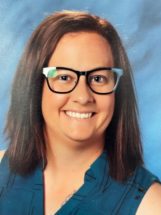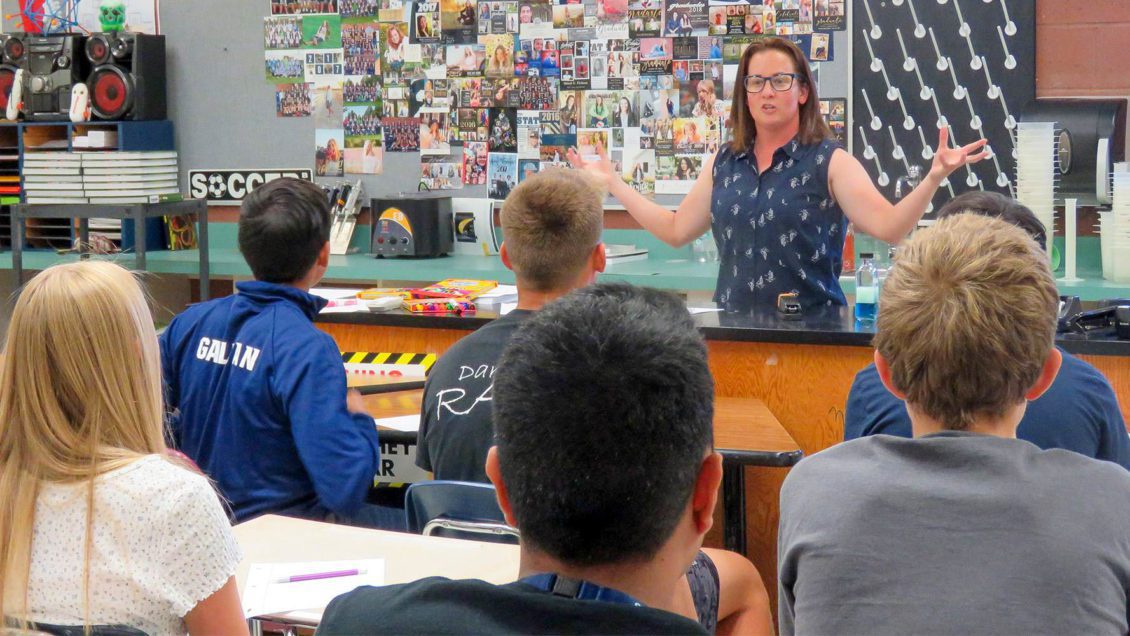After Kim Bowen enrolled in Clemson University’s online Master of Science in Biological Sciences program designed for science educators, it didn’t take long for her to put what she learned in her courses to use.
Bowen, a high school Advanced Placement biology teacher in Nampa, Idaho, planned her first year of classes in the program to coincide with the curriculum she was teaching in her own classroom.

“I think it has benefited my students. My Clemson cell biology course was always slightly ahead of what I was teaching my students, so I could add in some extra information in my class. If my students wanted to advance their knowledge beyond what we were covering, I could point them to material my professors had shared with me. I’ve also been reworking some of my lesson plans and labs to include more current information,” said Bowen, who has been teaching for 10 years.
The Master of Science in Biological Sciences for Science Educators online program has had a national impact since its start in 2010. Thousands of K-12 teachers and science educators employed by museums, libraries, field stations, research laboratories and community colleges have enrolled in the program’s courses. Students have come from 41 states and several foreign countries.
The program has awarded 730 M.S. degrees so far. There’s also a non-degree option for advanced students who would benefit from additional study, typically current K-12 teachers meeting recertification requirements. The program has 10 courses, seven with biological content and three covering scientific communication, experimental design and analysis, and conducting a research project.
“The online master’s program helps us to fulfill our mission to educate the next generation of students and prepare future scientists, educators and leaders,” said Saara DeWalt, chair of the Department of Biological Sciences in the College of Science. “It also is increasing biological literacy in our state and across the country.”
Meeting needs
Meeting the needs of educators isn’t new for Clemson’s Department of Biological Sciences. It was a natural evolution. The department had been providing courses for teachers for years before the creation of the M.S. online program.
“In 1999, Clemson University’s SC Life program offered its first two-week-long courses for teachers funded by an award from the Howard Hughes Medical Institute. The SC LIFE program used the natural history of South Carolina to illustrate basic biological concepts to stimulate inquiry-based learning,” said Bob Ballard, a professor in the Department of Biological Sciences and director of the online M.S. program. “Later, we created courses in other areas of biology.”
Then, teachers asked for the classes to be expanded into full-semester graduate courses to advance their science knowledge further, enhance their careers and get an M.S. degree.
“It is so gratifying to work with educators as they have knowledge and passion about the subject. As an instructor, I teach as well as learn from my students. I love the atmosphere of the ‘let’s learn together’ approach in my courses,” said Kaustubha “Kos” Qanungo, a lecturer in the Department of Biological Sciences who teaches in the master’s program.
Associate professor Michael Childress said, “Teaching teachers is one of the most rewarding parts of my job. When teachers learn how to conduct experiments with their own students, you know your love of science will reach many more students for years to come.”
Not just for teachers
But the program isn’t just for teachers.
Chris Nelson, a lieutenant colonel in the U.S. Marine Corps, graduated from the program this year. He will retire from the military on Dec. 1 and move to Charleston, where he plans to start some small businesses.
“One of the businesses is related to trees, flowers and plants,” said Nelson, who was stationed in Okinawa, Japan, when he started the M.S. program. “This curriculum had three classes that were directly useful for that business.”
Nelson, who already held an MBA in material logistics management, said being a part of the Clemson alumni network will help that business and the others he plans to start.
“My ability to connect with other Clemson alumni who are business owners should facilitate growth and increase opportunities for those who own their own businesses, so it will be a win-win situation for all,” he said.
Providing opportunity
Catherine Galecki, a biology teacher at William Fleming High School in Roanoke, Virginia, who will complete the program this fall, said her original career goal was to teach at the collegiate level. But her grandfather, who had a Ph.D., helped her figure out she didn’t like research, a likely requirement if she were on a college faculty. She became a high school teacher instead.
Galecki found out about the Clemson program through a Facebook group where A.P. Biology teachers often collaborate. She initially enrolled because she wanted to teach dual enrollment biology classes.
This program opens doors.
catherine Galecki, biology teacher at william fleming high school
In the six years Galecki has taught at William Fleming, the school has offered no dual enrollment science class because none of the teachers were eligible to teach it. “In high school, I never had the opportunity to take an A.P. or dual enrollment course. I wanted to offer that to my students,” she said. “Plus, if I ever wanted to switch school districts to be closer to home and teach upper-level classes there, I’d have to be able to teach dual enrollment. So it opens up opportunities for me.”
Galecki will teach dual enrollment classes at William Fleming for the first time this fall.
“I think it’s really important that the kids in my school get that opportunity because they’ve never been given it before,” she said.
Diverse curriculum
Peter Paulino, an adjunct professor at California State University Dominguez Hills in Los Angeles, pursued a master’s degree to expand his knowledge of biology and qualify for a full-time community college instructor position.

“The Clemson program is excellently designed to meet the needs of us teachers,” said Paulino, who graduated in August.
Convenience was a significant factor as the online format allows students to access lectures and homework assignments at their convenience. But there was also the opportunity for interaction with professors and other students, he said.
“Even though it’s online, I feel like I’m a part of the Clemson community. Most of our classes have discussion boards, and a lot of them have synchronous options, which is an excellent way to connect with our professors and classmates,” he said. “And, even though I’m in California, I’m being taught by world-renowned biology researchers at Clemson.”
When he was researching programs, Paulino found no others with a curriculum as diverse as Clemson’s.
“As a teacher, I am being equipped with this rock-solid foundation that I could not get from other schools,” he said. “I am very pleased with the program.”
Get in touch and we will connect you with the author or another expert.
Or email us at news@clemson.edu

